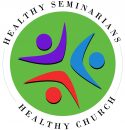25
JunBy: Karen Webster
Comments: 0
 June, 2020 – I clearly remember the day when I interviewed for the Th.D. in pastoral counseling program at Columbia Theological Seminary. This was something I very much wanted, and I was quite nervous! During the interview, I had the opportunity to speak with many of the professors with whom I was hoping to study.
June, 2020 – I clearly remember the day when I interviewed for the Th.D. in pastoral counseling program at Columbia Theological Seminary. This was something I very much wanted, and I was quite nervous! During the interview, I had the opportunity to speak with many of the professors with whom I was hoping to study.
I distinctly remember one part of that interview in particular. I was describing the work of Healthy Seminarians-Healthy Church, and how that informed my academic interests. One of the professors, thinking about what I had said, asked, “How does that work apply to black bodies?”
That was a good and insightful question, and one we still wrestle with, especially given recent events – the deaths of Ahmaud Arbery, Rayshard Brooks, George Floyd, Breonna Taylor, and so many more – that prove yet again how our culture, our church, this organization, and I, as a human being, struggle with the value of black lives and black bodies.
The Bible repeatedly offers a vision of constructive unity in a blessedly diverse world. But, like so many aspects of the divine kingdom, it is one that we are far from living into fully. In the meantime, people keep dying, and living in fear, and suffering in ways both large and small.
Intentionally or unintentionally, I am part of the system that makes this happen. The “intentionally” aspect of this is bad enough, but it is the“unintentionally” part that especially scares me and makes me realize just how much work I have to do around this manifestation of sin in my own life. Wendy Farley, professor of spirituality at University of Redlands, writes:
“Sin damages human beings and their communities by diminishing their capacity to perceive injustice, to experience compassion, and to perceive right from wrong. People participate in the process through which they are dehumanized by evil, acquiescing to it, accepting it…
This is the characteristic way sin functions: it corrupts the environment in which human beings must act and deceives them about their real situation… (it) so deeply infects a community that every action is tainted and corrupt… (it) becomes a kind of bondage that entangles human beings and communities even before they choose or desire evil.”
How blind am I? How often do I choose evil without realizing it? What kinds of evil do I tolerate, accept, even sanction? Too much, too often, too many.
The good that comes from this, I hope, is lasting structural change, and that lasting structural change starts with difficult, and ongoing, self-examination, confession, (hopefully) forgiveness, and commitment to something both different and far healthier. The time for this came long ago. I pray for the courage, finally, to live into this call.
Peace,
Travis Webster
HSHC Co-Founder
